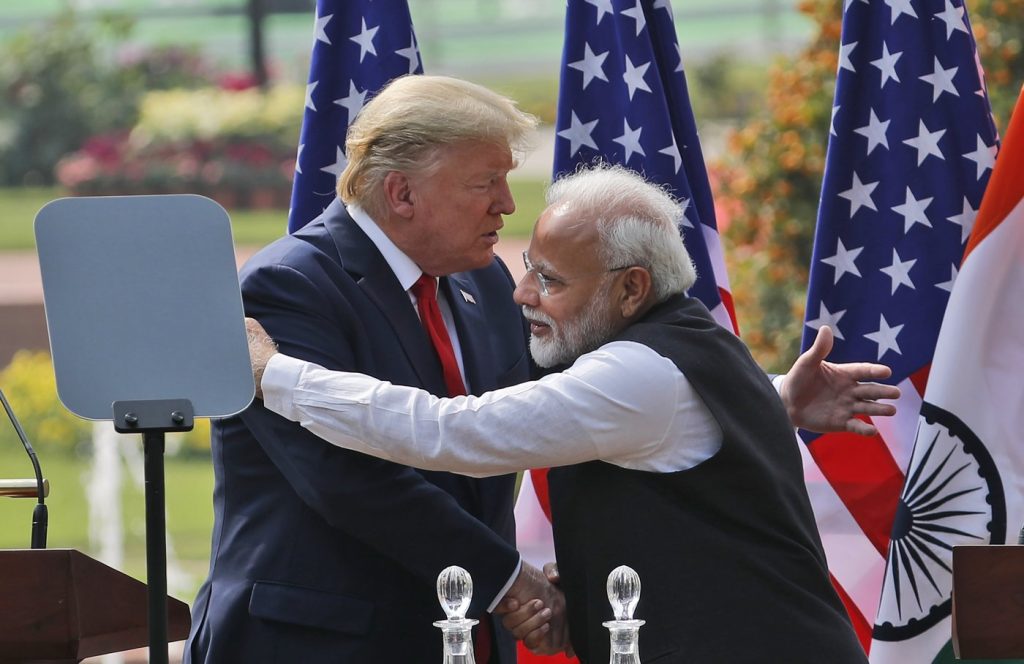NEW DELHI (AP) - Prime Minister Narendra Modi is set to embark on a visit to Washington on Wednesday, where his longstanding rapport with President Donald Trump will face significant tests. Modi aims to navigate the complexities of U.S. tariffs and potential further taxes on imports, seeking to maintain India's favorable position as a strategic partner of the United States. So far, India has not been subjected to new tariffs in a climate where others have faced economic penalties.
India’s relationship with the United States has evolved significantly, particularly in light of Modi's nationalistic policies and criticism over democratic backsliding in India. With Trump's recent presidency, Modi anticipates an opportunity to recommit to collaboration following Trump’s first term, particularly regarding tariff threats and trade relations. The meeting will be pivotal in determining how far both leaders will go to reach an agreement.
The body language between Modi and Trump will be closely scrutinized during this meeting. According to Meera Shankar, India’s former ambassador to the U.S., both leaders had a constructive working relationship previously, suggesting that they might focus on areas of mutual interest while minimizing disputes over core national interests. Shankar emphasized the importance of negotiation tactics, noting that many partners typically present reciprocal lists to leverage their negotiating power, and expressed hope that India will balance firmness with flexibility in addressing tariff disputes.
Modi, buoyed by his party's electoral victory in the recent state legislature elections in India's federal territory, including New Delhi, stated his intention to enhance collaborations with the U.S. in areas such as technology, trade, defense, and energy. In discussions with Trump earlier this year, the necessity for India to procure more American military hardware and to address the trade imbalance, which saw the U.S. importing $50 billion more than it exported to India, was highlighted. A White House account indicated that Trump reiterated this emphasis in prior communications.
Recently, India accepted the return of 104 migrants sent back on a U.S. military plane as part of a broader deportation strategy initiated during Trump’s administration. Notably, Modi’s government has already made concessions by lowering tariffs on U.S. products, including a reduction in the tariff on Harley-Davidson motorcycles from 50% to 40%. In 2023, retaliatory tariffs on various U.S. agricultural exports, including almonds and apples, were also rescinded.
Analysts speculate on further developments during Modi's visit, including potential agreements for India to purchase more American natural gas, aimed at reducing the U.S. trade deficit. Moreover, India plays a crucial role in the U.S. strategy to counterbalance China's influence in the Indo-Pacific, which complicates diplomatic relations due to the anticipated changes in the U.S.-China dynamic under Trump’s potential reset with Beijing.
Despite the complexities, both nations have a substantial trade relationship, with the Indo-U.S. goods and services trade exceeding $190 billion in 2023, and a notable trade deficit favoring India. Furthermore, India is gradually shifting its defense procurement focus from Russia, on whom it relies for nearly 60% of its defense supplies, towards the U.S., Israel, and the U.K., motivated largely by the ongoing war in Ukraine. Recent agreements indicate a burgeoning defense partnership, with plans for U.S. companies to collaborate with Indian firms in producing military equipment.
Experts believe that Modi's visit symbolizes an opportunity to solidify the Indo-U.S. relationship. As he navigates diplomatic waters with both Trump and broader geopolitical considerations, successful outcomes remain a priority. The nuances of this meeting will have long-term implications not only for U.S.-India relations but also for security dynamics in the region.











